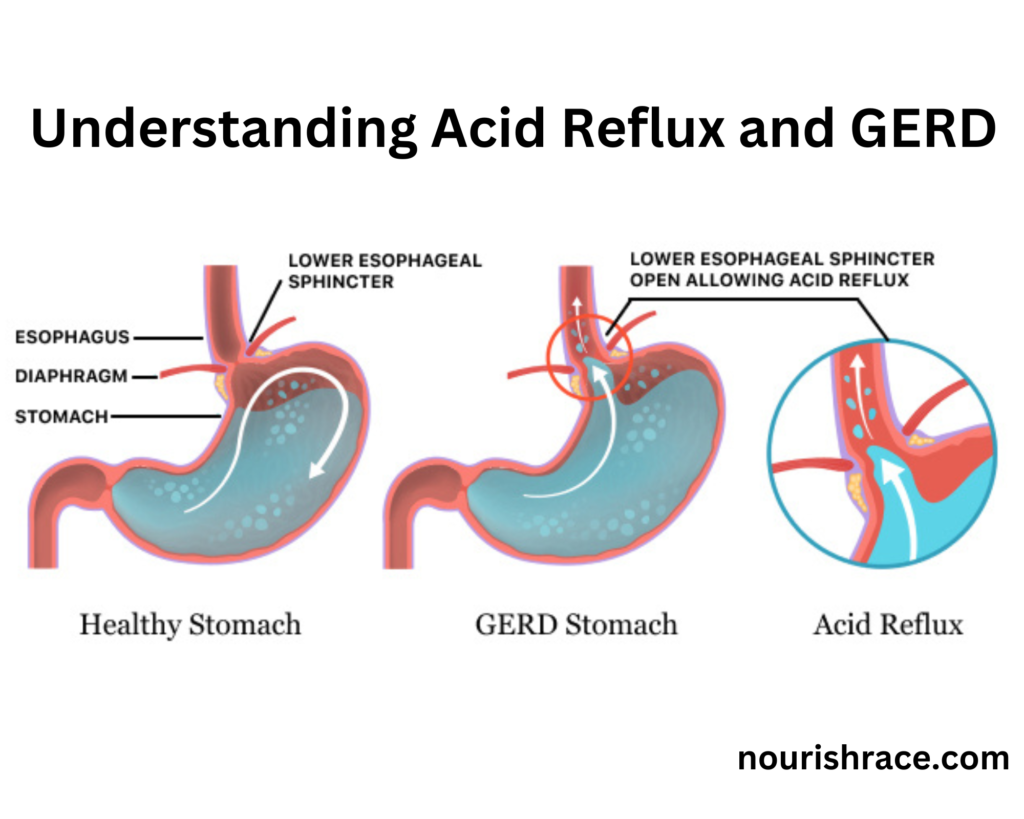If you’ve ever felt heartburn after every meal, you might be understanding acid reflux and GERD. Let’s discuss what acid reflux and Gerd are how to manage them effectively.
What is Acid Reflux?
Acid reflux occurs when stomach acid flows back up into your esophagus. This happens when you overeat, lie down after meals, or consume spicy foods and drinks.
What is GERD?
GERD (gastroesophageal reflux disease) is a more serious form of acid reflux. It occurs when the muscle between the esophagus and stomach doesn’t close properly, allowing stomach acid to leak into the esophagus and cause irritation and inflammation.

Symptoms of Acid Reflux and GERD
While understanding Acid Reflux and GERD common symptoms include:
- Burning chest pain after eating or lying down
- Sour taste in your mouth or throat
- Feeling like food is stuck in your throat
- Painful swallowing
- Chest pain or pressure
- A persistent cough, especially at nigh
Managing Acid Reflux and GERD
Dietary Changes
To manage Acid Reflux and GERD, avoid trigger foods like spicy dishes, citrus fruits, tomatoes, chocolate, caffeine, and alcohol. Instead, better to eat small, frequent meals throughout the day.
Lifestyle Modifications
Furthermore, maintaining a healthy weight, avoiding tight clothing around your abdomen, and elevating the head of your bed can help prevent night-time reflux. Additionally, try to walk after eating.
Medications
Moreover, over-the-counter antacids, H2 blockers, and proton pump inhibitors can provide symptom relief. For severe cases, prescription medications might be necessary.
Surgery
In some cases, surgery may be recommended to strengthen the lower esophageal sphincter or repair a hiatal hernia.
Alternative Therapies
Additionally, some people find relief through acupuncture, herbal remedies, or relaxation techniques.
click here for more: managing-GERD-how-to-prevent-acid-reflux-and-GERD-symptoms
Potential Complications
Untreated acid reflux and GERD can lead to serious complications like esophagitis, Barrett’s esophagus, esophageal stricture, respiratory problems, dental issues, and esophageal cancer. Therefore, seeking medical attention for persistent or severe symptoms is crucial to prevent these complications.

9 Comments
Keep it up, keep growing
good information
so informative thanks for sharing
Very informative great
Wow Amazing Article
Keep it up
Informative
Inte3rsting and helpful information
“Great article!Thought-provoking, insightful, and expertly written.”
Good Job keep it Up 👍🏻
Very interesting and informative.
Your hard work and talent have clearly paid off. This is excellent!